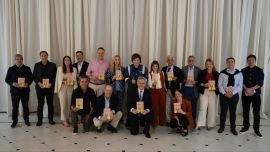Frustrated in 2018 by defeat in the Senate; postponed at the end of 2019 due to the general elections; suspended again this year due to the coronavirus pandemic – the campaign to legalise abortion in Argentina has once again returned to the government’s agenda, with President Alberto Fernández vowing to send the bill to Congress before the year is out.
Once again, the numbers in the Senate are the key challenge if the Peronist leader is to honour his campaign promise to legalise abortion. In August 2018, the Senate rejected the abortion bill by a 38-31 vote with two abstentions. The difference this time around looks to have narrowed since then but doubts persist – the government is sure to be crunching numbers before taking the final step of sending its bill to Congress.
According to a survey by Noticias Argentinas news agency, the Senate resulting from last year’s elections now has 35 senators opposed and 32 in favour, with four avoiding defining their public stance on the issue. Senator José Alperovich (Frente de Todos-Tucumán), a declared opponent of the push, is on leave.
With President Fernández fully committed to abortion reform, the balance within the ruling coalition’s caucus is crucial for the government, which is eyeing the numbers in order to gauge the best time to send the bill. Within that caucus 17 of its 40 senators (minus Alperovich) are against legalising abortion, including Majority Leader José Mayans (Frente de Todos-Formosa), who continually ratifies his position.
If the government cannot apply party discipline to its own caucus, the nays would be within two votes of an absolute majority and the ayes would need to convince the four undecided, who would thus become crucial to the outcome of the vote, along with Alperovich’s future.
Among the undecided is Lucila Crexell (Interbloque Federal-Neuquén), one of the two 2018 abstentions, while another is Roberto Mirabella (Frente de Todos-Santa Fe), who last year replaced Omar Perotti (elected governor), the other abstention in 2018.
Last summer Mirabella presented a bill to decriminalise abortion in the cases contemplated by the current protocol, namely rape and risk of life.
The other two undecideds both represent Entre Ríos Province: Edgardo Kueider (Frente de Todos) and Radical Senator Stella Maris Olalla (Juntos por el Cambio), a teacher who urges the importance of sex education in order to avoid terminations.
Another issue studied by the government is whether to define the situation of Alperovich (on leave since last November on charges of sexual abuse presented by one of his nieces) before the end of the year.
With these four undecided senators and Alperovich’s future as the main variables, the deciding vote in the event of a draw would be cast by Vice-President Cristina Fernández de Kirchner presiding over the chamber. The former president voted in favour as senator in 2018, despite opposing abortion reform throughout her 2007-2015 presidency.
– TIMES/NA






















Comments